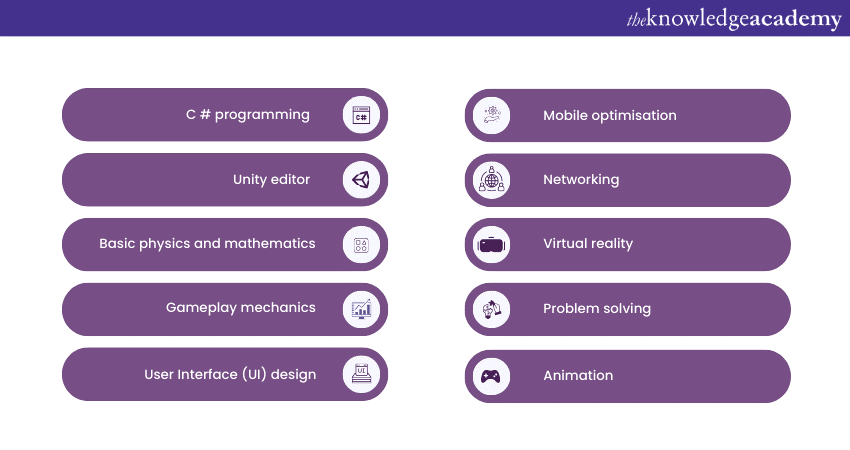We may not have the course you’re looking for. If you enquire or give us a call on +353 12338944 and speak to our training experts, we may still be able to help with your training requirements.
Training Outcomes Within Your Budget!
We ensure quality, budget-alignment, and timely delivery by our expert instructors.

The world of game development has witnessed a phenomenal transformation over the past decade, and Unity has been at the forefront of this revolution. Unity stands as a robust and adaptable game development engine that has empowered developers to craft remarkable games and interactive experiences across diverse platforms. This blog will explore the essential skills and techniques every aspiring Unity Developer should master to excel in this ever-evolving field.
Unity has emerged as one of the most influential and versatile game engines in this ever-evolving game development landscape. Its user-friendly interface, cross-platform capabilities, and robust scripting support have made it a go-to choose for gaming developers and established studios. To harness the full potential of Unity, aspiring game developers must acquire a diverse set of skills and techniques. This comprehensive guide on Unity Developer Skills explores the core competencies to create captivating games using Unity’s powerful engine.
Table of Contents
1) Who is Unity Developer?
2) Skills and techniques required for Unity Developers
a) C # programming
b) Unity editor
c) Basic Physics and Mathematics
d) Implementing Gameplay Mechanics
e) User Interface (UI) design
f) Mobile optimisation
g) Networking
h) Virtual Reality (VR)
i) Problem solving
j) Animation
3) Conclusion
Who is Unity Developer?
To understand what Is Unity we must know Unity Developers are the ones who primarily utilise the Unity engine as a run-time environment for video games. A Unity Developer oversees creating games using the Unity framework in the total sense. This entails speaking with the game's designers and incorporating their features. Using Unity, the developer transforms the design specification into an in-engine reality.
A developer interested in creating captivating and immersive gaming experiences, Unity is one of the leading game development platforms and offers many tools and features to bring your ideas to life. This blog will explore the essential skills and techniques every Unity Developer should master to excel in game development.
To the furthest extent possible, the project scope should be realised. Unity Developers will interact with the larger team to construct an efficient pipeline. They will each contribute uniquely to the seamless operation of projects by creating and maintaining dependable and reusable code. Additionally, they will apply their ability to spot flaws and bottlenecks to any unanticipated hiccups and develop creative solutions.
Try out new Game Development Courses for a successful career!
Skills and techniques required for Unity Developers
To become proficient in Unity development, we must familiarise ourselves with its interface. Unity's interface consists of several windows and panels, each serving a specific purpose. Understanding how to navigate and customise the interface will significantly enhance your workflow.
Familiarise yourself with Unity's intuitive interface, scene hierarchy, and how to navigate within the UI efficiently. Armed with these skills and a passion for creating captivating games, you will unlock your full potential as a Unity Developer and contribute to the future of the interactive gaming ecosystem.
Learning about game objects, their transformations, and the various components that empower them, such as scripts, colliders, and rigid bodies, also discover how to import 2D/3D assets, textures, audio, and animations into Unity and optimise their performance within the project. This section will cover the fundamental concepts and tools that form the backbone of Unity Game Objects and Components.

C # programming
C is the elementary programming language used in Unity Game Development. It is widely used in the development of game consoles, handheld gaming devices, and other embedded systems. Its ability to work closely with hardware resources and the reduced overhead of the language make it a preferred choice for such systems.
Mastering C language is essential for creating gameplay mechanics, handling user inputs, managing data, and implementing complex algorithms. As a Unity Developer, you must be proficient in C# to bring your ideas to life effectively. Mastering C# scripting will empower you to create complex game mechanics, implement AI systems, and handle player interactions effectively.
Learn more about C programming with our C # Programming for Unity Gaming Development Training & Courses!
Unity editor
The Unity Editor is a powerful and versatile tool that streamlines the game development process. Learning its ins and outs will significantly enhance your productivity. Understand how to import assets, set up scenes, manage animations, and utilise the inspector effectively. Unity's intuitive interface empowers developers to work efficiently and iteratively.
By leveraging the Unity Editor's features like Unity Visual Scripting and combining them with creative and well-thought-out gameplay mechanics, developers can craft captivating games that resonate with players and leave a lasting impression.
Basic Physics and Mathematics
Game development requires a solid grasp of physics and mathematics. Unity has a built-in physics engine that enables realistic interactions between objects in the game world. Knowledge of vectors, trigonometry, and collision detection will enable you to create captivating and believable game environments. It is a robust physics engine and animation system that allows developers to create lifelike movements and interactions.
Gameplay mechanics
A key aspect of game development is implementing realistic physics and animations. Gameplay mechanics form the core of any successful game. Understanding how to design and implement engaging gameplay mechanics is crucial. Learn about state machines, scripting player movements, and integrating character controllers to create a seamless and immersive gaming experience. Gameplay mechanics are the core systems and rules that govern how a game functions and how players interact with it.
These mechanics are the building blocks that create engaging and challenging gameplay experiences. In Unity, the game development engine, the Unity Editor plays a crucial role in designing, implementing, and testing these gameplay mechanics. By implementing accurate physics and mechanics, a developer can create a believable and dynamic game world that reacts naturally to player actions.
User Interface (UI) Design
A well-designed user interface can significantly impact a game's success. Understand how to handle user interactions and respond to UI events, such as button clicks and touch gestures, to make your game more interactive. Unity provides various tools to create intuitive and visually appealing UI elements. As a Unity Developer, you must learn how to create responsive menus, HUDs, and interactive elements to enhance the overall user experience.
Mobile optimisation
With the rapid growth of mobile gaming, optimising games for mobile platforms has become essential. Learn about performance optimisation techniques, reducing memory usage, and achieving a balance between graphics quality and performance. Unity's adaptive performance system can be an asset in achieving this goal. Learning how to optimise game assets, such as textures and models, to reduce memory usage and improve loading times.
Networking
Adding multiplayer functionality to your games can broaden their appeal and longevity. Understanding Unity's networking capabilities and learning to synchronise game states between multiple players is essential for developing engaging multiplayer experiences. With networking, players can join games and interact with each other in real time. This enables seamless communication, collaboration, and competition, fostering a sense of belongingness and competition among players.
Virtual reality
The future of gaming lies in immersive technologies like VR and AR. Familiarise yourself with Unity's XR tools and understand how to create interactive and immersive experiences in virtual and augmented reality. This skill will make you a highly sought-after developer in this booming domain. Virtual Reality (VR) is a top edge technology that has revolutionised the way we experience and interact with digital content.
For instance, by wearing a VR headset, users are transported to a virtual world where they can interact with objects, characters, and environments as if they were physically present. In the field of gaming, developers can explore the fascinating world of virtual reality, its applications, and its impact on the gaming industry.
Learn more about Gaming development with our Game Development Training & Courses!
Problem solving
No matter how skilled you become, bugs and issues are inevitable in game development. Being proficient in debugging and problem-solving is crucial. Learn how to use Unity's debugging tools effectively to identify and resolve issues efficiently, ensuring smooth gameplay for your users. Discover Unity's built-in profiling and debugging tools to identify performance issues and optimise users’ games efficiently.
For instance, Bugs can range from simple syntax errors to more complex logic issues that lead to unexpected behaviour in the game. Through debugging, developers can pinpoint the source of the problem and make the necessary corrections to ensure the game runs as intended.
Animation
Animation breathes life into your game by bringing characters, objects, and environments to motion. Unity's powerful animation system enables you to create intricate and captivating animations seamlessly. Animation in Unity is vital for any game developer aiming to create compelling and realistic gaming experiences.
Understanding the principles of physics and leveraging Unity's animation system will empower you to craft dynamic, interactive, and visually stunning worlds that capture the players' imagination. By combining accurate physics simulations with captivating animations, you can create games that engage players and keep them coming back for more.
Conclusion
Becoming a skilled Unity Developer requires dedication, practice, and a passion for creating immersive gaming experiences. The journey may be challenging, but mastering Unity's essential skills and techniques will empower you to transform your game ideas into captivating realities. Continuously hone your abilities, stay updated with Unity's advancements, and collaborate with fellow developers to evolve and grow within this dynamic industry. So, let your creativity flow and venture into your quest to conquer the world of Unity game development.
Frequently Asked Questions
Upcoming Programming & DevOps Resources Batches & Dates
Date
 Game Design and Development with Unity Training
Game Design and Development with Unity Training
Thu 1st Jan 1970







 Top Rated Course
Top Rated Course



 If you wish to make any changes to your course, please
If you wish to make any changes to your course, please


